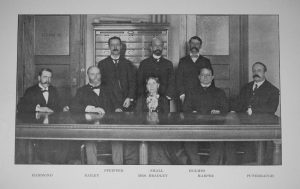
photo by Special Collections. Bradley University Library
Lydia Moss Bradley was more than a founder of a major academic institution. She was engaged in a multitude of business endeavors, ranging from real estate and farmland development to the finance industry.
While some regarded Lydia as a recluse, she remained constantly busy. Every morning, Lydia’s business manager, W. W. Hammond, would meet Lydia at her house to discuss business affairs.
“It has been customary to meet at her house every morning and discuss that business transacted the day before and consider new business,” In his biography of Lydia, Hammond said, “At these meetings, all papers necessary to be signed were presented and read to her before she signed them. She signed all her checks knowing what they were [for].”
Hammond’s account of Lydia’s business affairs detailed her foresight into the value of property development. Over the course of 10 years, this foresight is what enabled Bradley’s estate to amount to more than $1 million dollars, or more than $25 million in today’s dollars.
“Mrs. Bradley had invested largely in acre property then adjoining, now included in, the City of Peoria,” Hammond said. “The lots were selling at $200. A few years later, [when] I finished selling out these additions [for her], [she was] getting at least $1,000 [per] lot.”
However, Hammond did not identify Lydia as a shrewd or manipulative investor, but rather one who believed in enhancing the lives of those within her community.
“In the lending of money, Mrs. Bradley has been uniformly helpful to the borrower, seldom has had a foreclosure, never called in a loan as long as the interest was paid and, by her loans, has helped build nearly every church in the City [of Peoria],” Hammond said.
Lydia also made large contributions to the development of areas containing formerly-infertile farmland.
“Her development of farm property will be found perhaps the clearest examples of making money and doing good at the same time,” Hammond said. “In 1885, the drainage of [a] marsh, containing 5,000 acres had just been completed … which she had just bought at $10 per acre. She built farm buildings and fences and put the land under cultivation, but the crops were poor over the whole marsh … A car load [of salt] was ordered and spread broadcast on 100 acres of the land … At once the whole neighborhood adopted the plan, and good crops have been uniformly secured ever since. These lands are now selling for $140 an acre.”
Not only did Lydia continuously make wise investments over her lifetime, but she also broke female employment barriers that existed in her time. In 1875, Lydia became a board member of the First National Bank in Peoria, making her the first woman in the United States to achieve the title.
However, the designation did not completely satisfy Lydia, as she remained actively involved with the bank over her 25 years as director, even providing criticism when she deemed necessary. In one instance, Lydia commented sarcastically that she did not believe bank president William E. Stone was doing an adequate job.
“Well, it seems to me that you have done the best you know how,” Lydia told him.
While the societal contribution of Lydia most commonly remembered today lies in the academic institution Bradley University, it is important not to forget the impact Lydia made in the Peoria community and as a role model for aspiring women in business.




